Imagine your therapy practice is a beacon in the digital sea, but without digital marketing, it’s like winking in the dark—effective, but nobody knows you’re doing it. Enter the digital age where even therapists must navigate online to connect with clients. Your practice can shine brightly with the right strategies, reaching those in need. This article, hosted on Plerdy’s blog—a platform dedicated to optimizing your online presence—will guide you through eight proven tactics. From defining your brand to leveraging SEO, social media, and beyond, we’re here to turn the light on your digital marketing efforts. Let’s dive in.
Crafting Your Brand Identity in the Digital Realm for Therapists
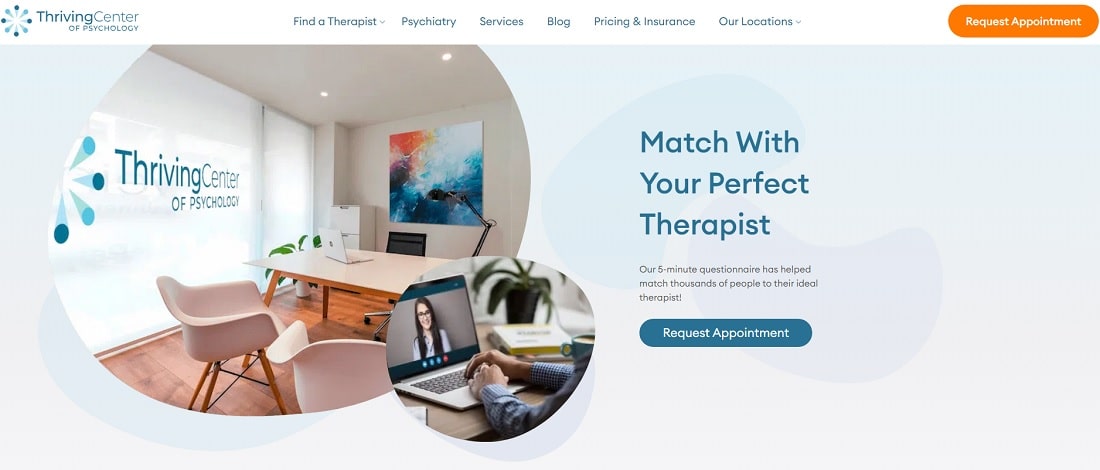
In the bustling digital marketing landscape, your brand identity is the silent echo that captures the essence of your therapeutic practice, making it crucial for therapists to stand out. It’s more than just selecting colors or a design for your logo; it’s about creating a reflection of your therapy services that resonates with those seeking help. Effective brand marketing involves deep diving into what you offer to make it a beacon for potential clients.
Identifying Your Unique Digital Footprint
Every therapist brings something unique, but pinpointing what sets you apart in digital marketing is key. Whether your expertise lies in cognitive behavioral therapy, mindfulness techniques, or relationship counseling, leveraging this specialization is essential. This clarity not only magnetizes your ideal clientele but also clarifies the benefits of choosing you as their therapist, enhancing your digital marketing strategy.
Harmonizing Visual and Linguistic Brand Elements
Balancing visual and linguistic branding elements is pivotal for therapists aiming to create a consistent and impactful brand identity. Opt for colors and visuals that emanate peace and reliability, mirroring the therapeutic journey. Your language should complement this, being approachable, empathetic, and professional across all digital channels. Integrating these elements into your website, social media profiles, and all marketing materials is crucial for maintaining a unified brand image that leaves a lasting impression.
To crystallize your brand identity, consider these steps:
- Articulate your core principles and mission statement.
- Select a color palette and logo that accurately represent your therapeutic approach.
- Devise a concise tagline that encapsulates your unique selling proposition.
Your brand embodies the spirit of your practice in the digital world, serving as a magnet for your ideal clientele. As highlighted by Forbes, a robust brand identity does more than distinguish you from your competitors; it forges a deep connection with your audience, fostering trust and loyalty. Establishing your brand identity is a vital phase in your digital marketing strategy. It transcends mere aesthetics, forging a genuine bond with your audience. Invest time in honing your brand, and observe as it evolves into your most potent asset in attracting and retaining clients, underscoring the importance of digital marketing for therapists.
Elevating Your Therapy Practice with a Professional Website
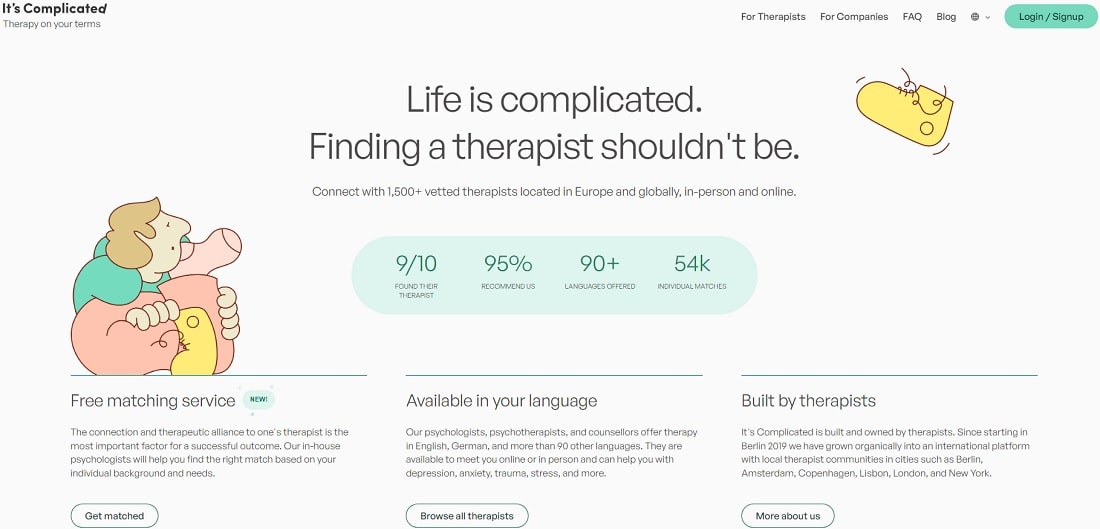
In the current digital era, a therapist’s website serves as the virtual entry point to their services. Much like a warm and inviting office space, your digital presence via your website must deliver a positive initial impression, be straightforward for visitors to explore, and effectively convey the range of services and core values you uphold. This endeavor transcends mere aesthetics; it’s about crafting a user-friendly experience that fosters connections.
Designing for Digital Clarity and Comfort
A top-tier website for therapists is characterized by its cleanliness, welcoming nature, and navigational ease. The design must mirror the serenity and security found within your therapy sessions. Opting for calming color schemes and readable fonts enhances the user experience for all prospective clients. A key to digital marketing success is ensuring accessibility; a cumbersome website will deter visitors. Utilizing tools like the W3C Web Accessibility Initiative to test your website’s user-friendliness is essential to guarantee access for a diverse audience.
Content Strategy and SEO Mastery
In digital marketing, content rules. Your therapist website should succinctly communicate who you are, your unique therapeutic services, and how you can assist potential clients. Crafting an engaging ‘About Me’ page, thorough descriptions of your services, and maintaining a blog to offer insights and foster deeper connections are crucial. However, remarkable content must also be visible. Adopting SEO (Search Engine Optimization) strategies is fundamental in elevating your website’s visibility in search results, thereby increasing the likelihood of reaching those needing your expertise. Incorporate pertinent keywords throughout your content, utilize alt tags for images to boost SEO, and ensure your website is optimized for mobile devices, adhering to Google’s mobile-first indexing guidelines.
Your website is a cornerstone of your marketing strategy as a therapist. It acts as the platform where potential clients can gain insight into your practice and determine if they resonate with your approach. Ensuring your site is professional, inviting, and rich with valuable information is non-negotiable. Continuously refreshing your content and interacting with visitors through blogs or FAQs can attract new clients and initiate the therapeutic process with the first online interaction. With clever digital marketing, your website may attract and serve more customers.
Leveraging SEO Strategies
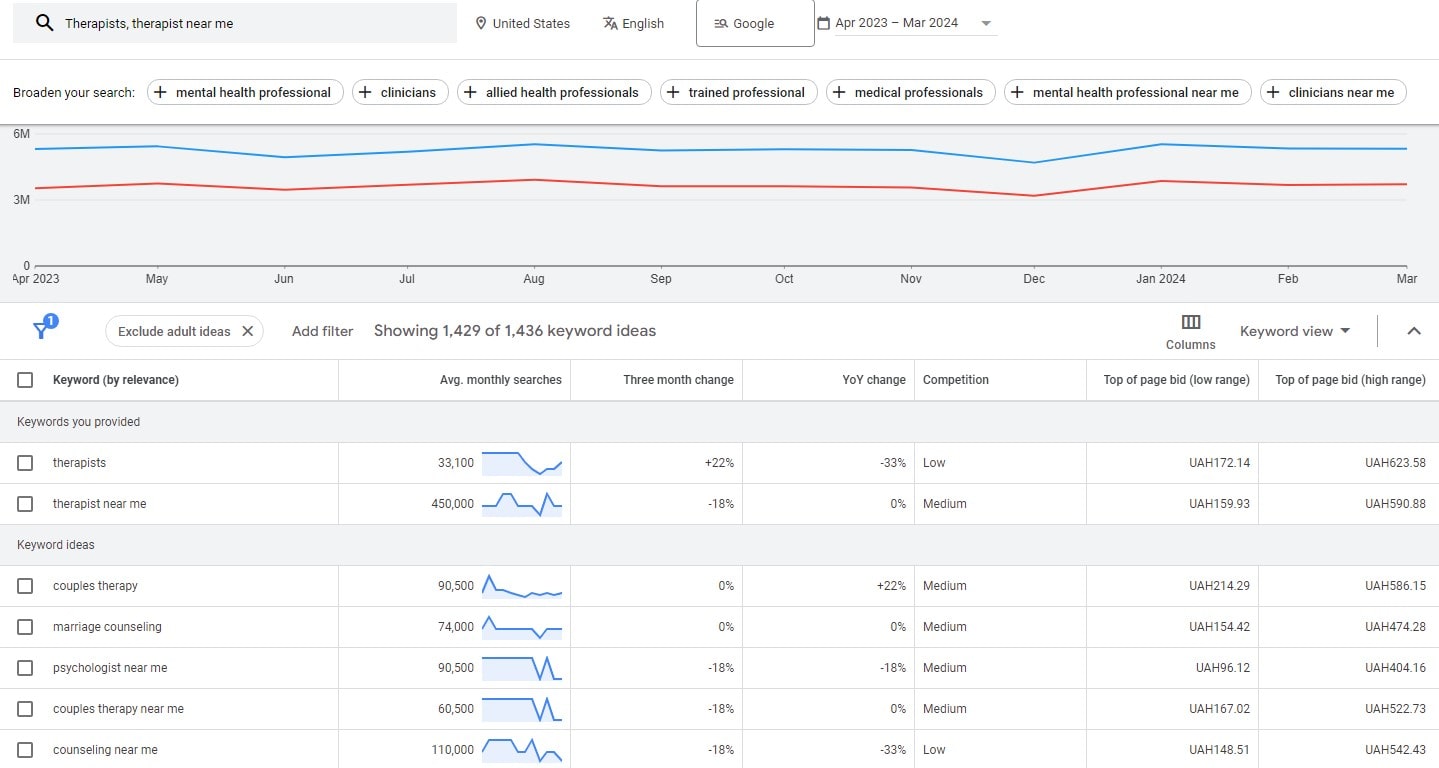
Navigating the vast ocean of online content can feel daunting, but SEO (Search Engine Optimization) is your compass, guiding potential clients to your therapy practice. In a digital world where visibility is key, mastering SEO strategies ensures you don’t just exist online but thrive.
Keyword Research
Understanding your target customers’ searches is the core of any SEO approach. You may study therapy search trends and terms with Google Keyword Planner. Incorporating these keywords into your website’s content, from blog posts to service pages, ensures search engines recognize your site as a relevant answer to those queries.
Local SEO
For many therapists, the target audience is local. Optimizing your website for local search means focusing on location-based keywords and claiming your Google My Business listing. This boosts your local search rankings and gives potential clients your practice address, hours, and services. Encourage happy customers to post Google My Business reviews to increase local SEO.
A solid SEO strategy takes time to create and pay off, but it is worth it. It’s about ensuring that when someone takes the brave step to seek help, your practice greets them. Regularly review your SEO performance, updating your strategies to reflect changing search trends and algorithms.
Leveraging SEO is not about manipulating search engines but enhancing your online presence to connect with those in need. It’s crucial to your digital marketing strategy to ensure your therapy practice is visible, accessible, and relevant. With the right approach, SEO helps you reach more clients and supports them on their journey to finding help.
Leveraging Social Media Marketing for Therapists

Social media marketing is not merely a conduit for leisurely posts or entertainment; for therapists, it represents a vital channel for engaging with potential clients and nurturing a supportive online community. A strategic social media presence in digital marketing is paramount for distinguishing your therapy practice.
Strategizing Platform Selection for Optimal Marketing
The landscape of social media marketing presents various platforms, each with unique strengths for therapists aiming to maximize their digital marketing efforts. Identifying the platforms where your target demographic is most active is crucial. Facebook and Instagram, with their blend of personal and informative content capabilities, often serve as prime channels for therapist marketing. LinkedIn stands out for its professional networking opportunities, enabling therapists to highlight their expertise and connect with colleagues, further solidifying their digital marketing strategy.
Content Marketing and Engagement Tactics
Effective social media marketing for therapists hinges on creating and sharing content that deeply resonates with your audience. This includes educational articles on mental health, wellness tips, and interactive content such as surveys or Q&A sessions, which are pivotal for a robust digital marketing strategy. The objective extends beyond mere promotion; it’s about fostering a community where open discussions and support thrive. Engaging directly with followers through comments and personal messages strengthens relationships and is a key trust-building component of your marketing efforts.
The Integral Role of Social Media in Digital Marketing for Therapists
Social media is an indispensable tool in a therapist’s digital marketing toolkit, offering direct engagement with prospective clients and a platform for sharing valuable mental health resources. It’s about crafting a marketing strategy prioritizing consistency, authenticity, and meaningful engagement. Through such an approach, therapists can enhance their online visibility, contribute to the mental health conversation, and build a strong, relatable brand.
In today’s digital age, a therapist’s social media marketing presence can be as critical as the physical location of their practice, acting as the initial point of interaction and the beginning of therapeutic relationships. Implementing a strategic social media marketing plan can bridge the gap between therapists and those seeking their expertise and care, underscoring the essential role of digital marketing in expanding a therapy practice. This reaffirms the necessity of integrating the “marketing,” “digital,” and “therapist” keywords within the framework of developing an effective digital marketing strategy, ensuring that therapists can successfully reach and engage their intended audience.
Enhancing Therapy Practices with Targeted Email Marketing Strategies

Email marketing emerges as more than a mere outreach method; it’s a pivotal digital marketing tool enabling therapists to forge deep, enduring connections. For therapists, the power of email marketing lies in its ability to facilitate direct, personalized communication with prospective and current clients, sharing invaluable insights and the latest updates from your therapy practice.
Developing a Robust Email Marketing List
The cornerstone of successful email marketing for therapists involves cultivating a subscriber list of individuals genuinely interested in your therapeutic services. Achieving this can involve offering compelling incentives, such as a complimentary ebook on mental health coping mechanisms or exclusive access to a therapeutic webinar, in return for their email subscription. The membership method should be simple and prominent on your website and social media channels to attract sign-ups.
Mastering the Art of Email Communication
With a dedicated list in place, the essence of email marketing for therapists revolves around dispatching content that captivates and delivers tangible value to your audience. This might include a regular newsletter with advice on stress management, noteworthy developments within your practice, or insightful pieces on mental health. Personalizing these communications by incorporating the recipient’s name and segmenting your audience to tailor content to their interests significantly enhances engagement. The aim is to enrich your subscribers’ lives with emails, steering clear of bombarding them with excessive communication.
Email marketing is an invaluable digital marketing channel for therapists intent on nurturing stronger bonds with their audience. It presents a unique platform for delivering personalized messages, showcasing your expertise, and ensuring your therapy practice remains a focal point for those you serve. By dedicating efforts to assembling a quality email list and generating impactful, meaningful content, therapists can transform email marketing into a critical component of their broader digital marketing strategy, effectively engaging their target audience and reinforcing their marketing efforts.
Optimizing Digital Marketing Through Strategic Online Advertising for Therapists
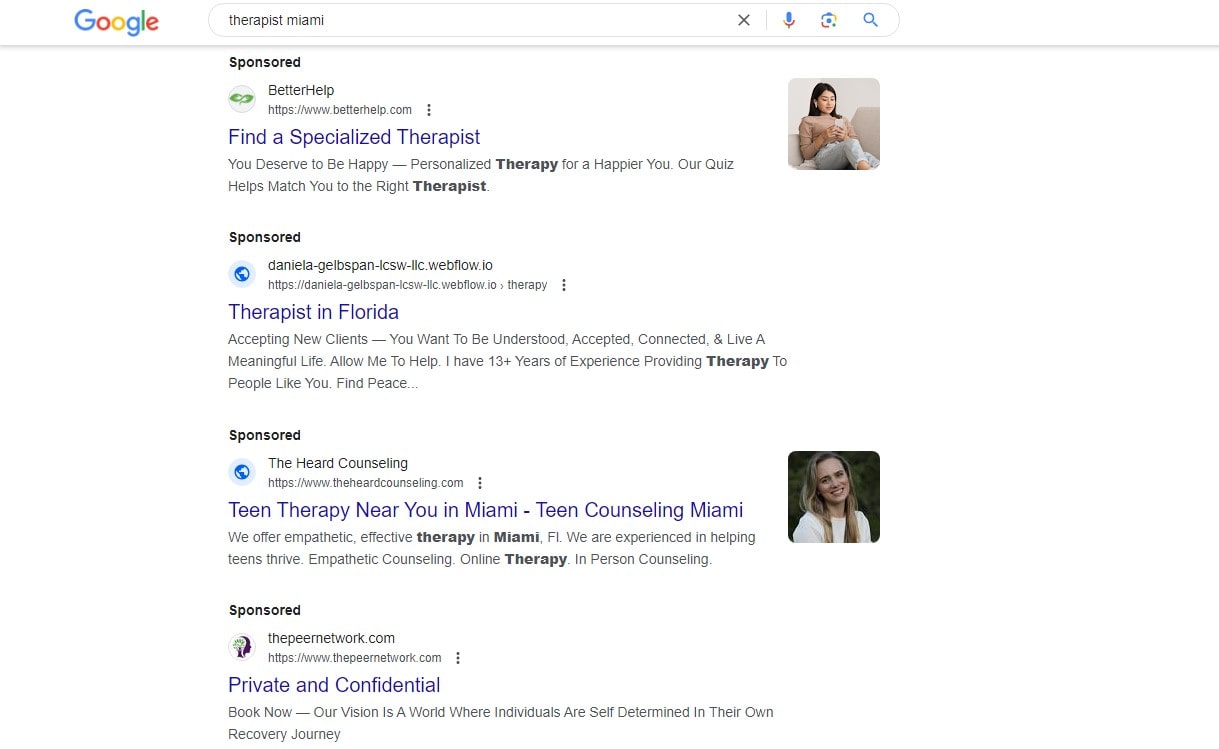
In the digital world’s vastness, making your therapist practice stand out can be akin to finding a way to be heard in an overcrowded room. Online advertising is a powerful megaphone for therapists, elevating their message to reach those seeking assistance. This powerful marketing technique cuts through digital noise to reach your consumers.
Leveraging Google Ads for Enhanced Visibility
Embarking on a Google Ads campaign might initially seem complex, yet it’s an invaluable marketing strategy for therapists aiming to increase their digital presence. By focusing on specific keywords associated with your therapy services, like “anxiety therapy near me” or “marriage counseling,” you position your offerings to appear prominently in search results. This strategic placement ensures that your practice is visible when someone seeks professional help, a key aspect of effective digital marketing.
Maximizing Reach with Social Media Advertising
Facebook and Instagram are powerful advertising tools and social networks. Advanced targeting lets therapists target by demographics, interests, and behaviors on these platforms. This precision ensures your marketing message is delivered to individuals most likely to require therapy services. Designing ads that resonate emotionally and address your potential client’s needs can dramatically boost engagement and lead to successful conversions.
Today’s therapists need online advertising for their digital marketing approach. It grants the ability to proactively reach out to those seeking support, offering a beacon of hope when they are most in need. By harnessing the capabilities of Google Ads and social media advertising, therapists can significantly broaden their reach, attracting a larger audience and establishing meaningful connections with clients best suited to their services. With thoughtful execution and a compelling marketing message, online advertising can transform initial clicks into lasting therapeutic engagements, underscoring the pivotal role of digital marketing for therapists.
Content Marketing and Blogging
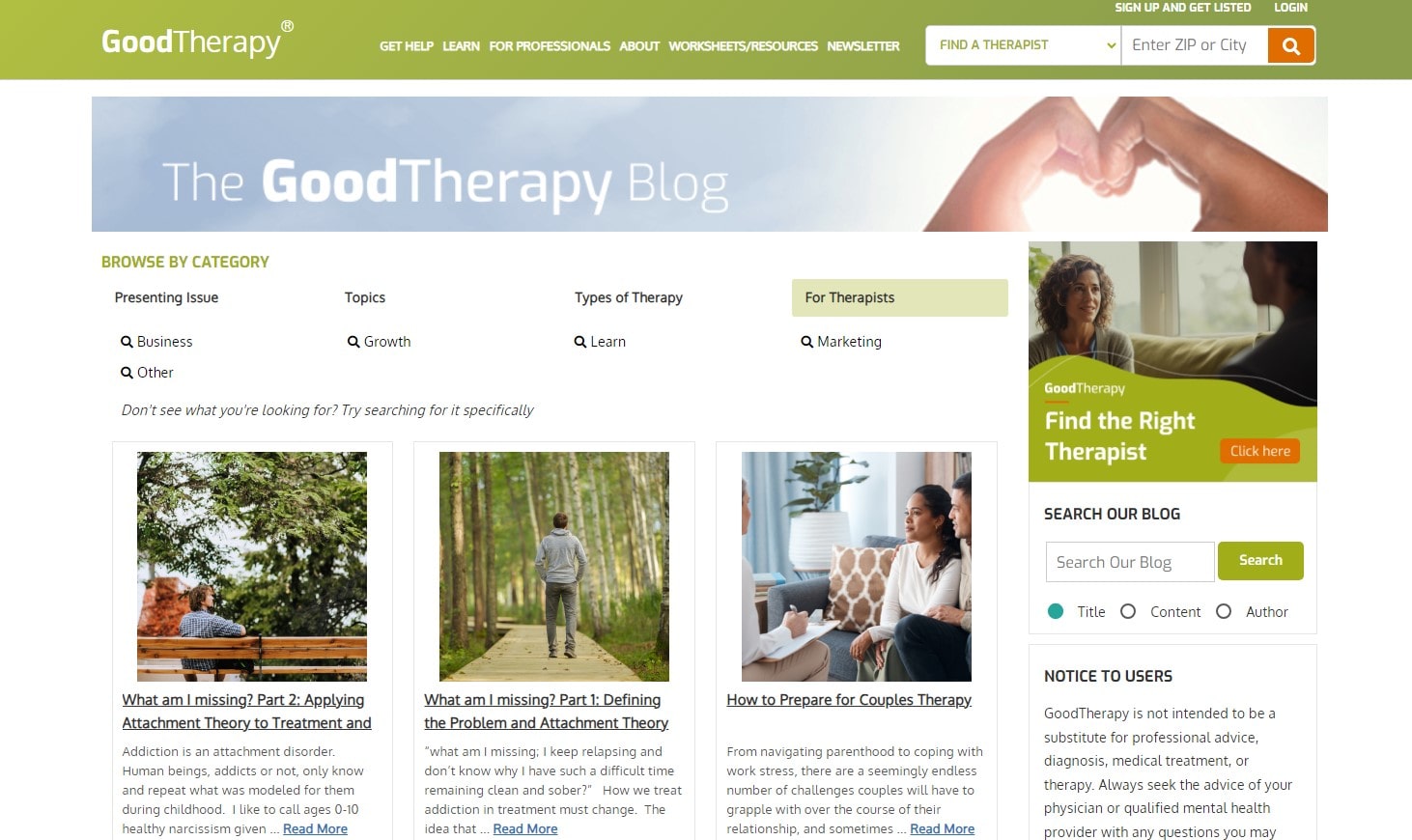
Content marketing and blogging are not just about filling your website with words; they’re about sharing knowledge, building trust, and establishing a connection with your audience. As a therapist, your insights can offer hope, provide relief, and even be the first step toward healing for someone.
Blog Content Ideas
Start with topics that resonate with your expertise and your clients’ needs. Share strategies for coping with anxiety, the benefits of mindfulness, or insights into relationship dynamics. People seeking help can trust your blog. Include actionable advice, personal anecdotes that respect confidentiality, and up-to-date research findings to add depth and value to your posts.
SEO for Blogs
Incorporate SEO best practices to ensure your valuable content reaches those in need. Use relevant keywords naturally, craft engaging meta descriptions, and include internal links to other sections of your website. Google’s Keyword Planner can help you locate client words. Optimizing blog posts helps search engines index and rank them, improving online visibility.
Content marketing and blogging are powerful tools in the digital marketing toolkit for therapists. They let you showcase your skills, network with prospects, and build your brand. Consistency matters. Publishing quality blog content engages people and shows search engines your website is informative. With each post, you’re not just reaching out but deep into the hearts and minds of those you aim to help.
Harnessing the Power of Video Marketing
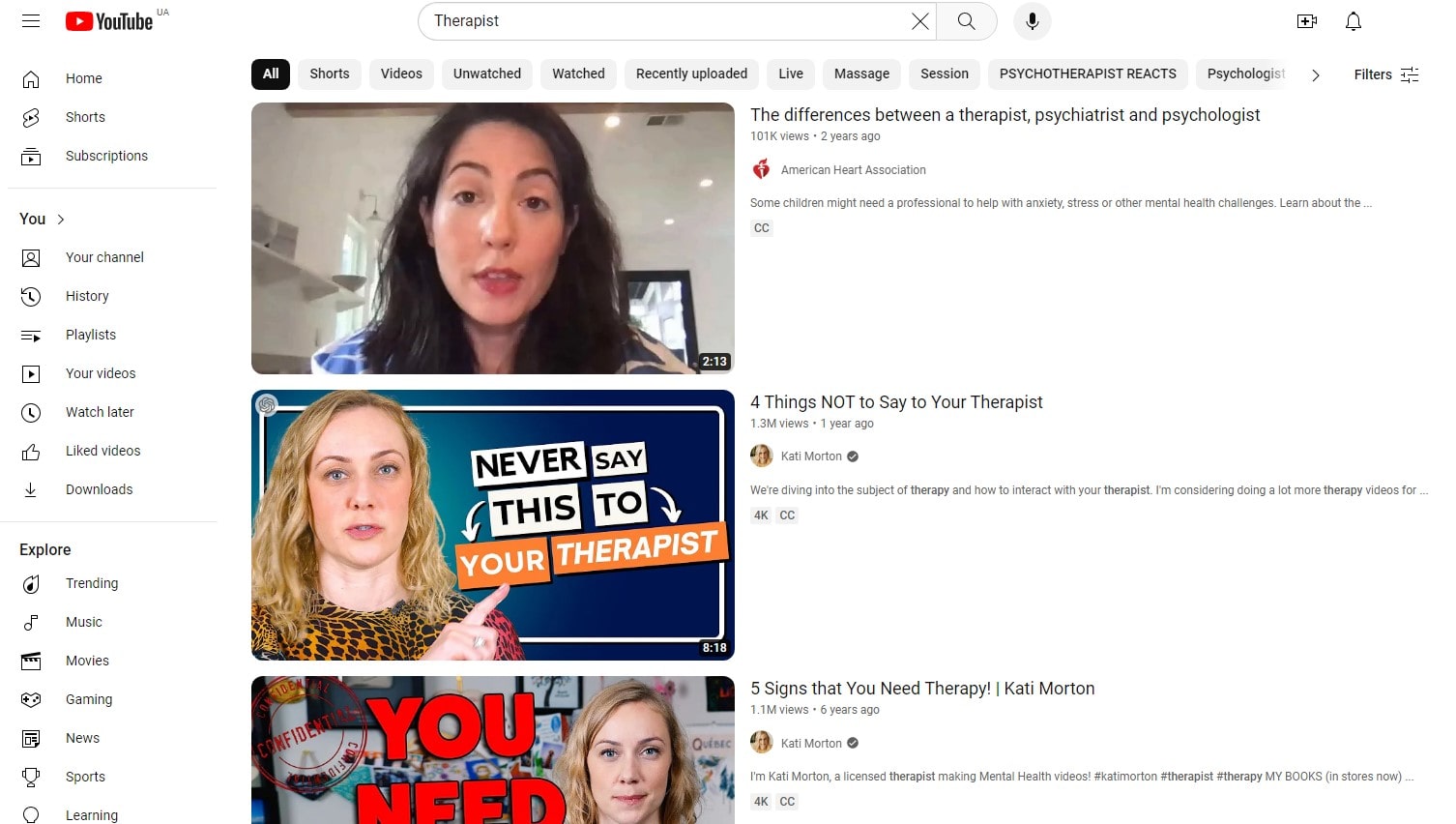
Video marketing can help therapists navigate the digital world in a screen-dominated world. This dynamic media expresses your empathy, knowledge, and therapeutic approach better than words.
Creating Engaging Video Content
Begin with content that speaks to the heart of what your potential clients are seeking. Whether explaining the therapy process, sharing tips for mental wellness, or offering insights into common psychological challenges, ensure your videos are informative and engaging. Use real-life examples (while maintaining confidentiality) to illustrate your points and help viewers see the tangible benefits of seeking therapy.
Video SEO and Distribution
Once your videos are ready, optimizing them for search engines is crucial to ensure they reach your intended audience. Use descriptive titles, detailed descriptions filled with relevant keywords, and tags that accurately represent the video content. Platforms like YouTube serve as a place to host your videos and act as search engines themselves. Sharing your videos across your website, social media, and in newsletters can amplify their reach and impact.
Harnessing the power of video marketing can significantly enhance the online presence of your therapy practice. It breaks down barriers and demystifies therapy by helping you interact with potential clients. Authenticity resonates; let your genuine desire to help guide your video content. Your videos can attract and support customers with careful creation and dissemination.
Conclusion
Embarking on the digital marketing journey can transform your therapy practice from a hidden gem into a beacon of hope for those in search. The explored tactics are your roadmap to visibility and connection in the digital world. But don’t stop here. Digital marketing is constantly changing, so staying educated is crucial. Plerdy’s blog has more digital marketing articles to help you improve your practice. Ready to elevate your online presence? Let Plerdy be your partner in navigating the digital realm, offering tools and insights to amplify your impact.
